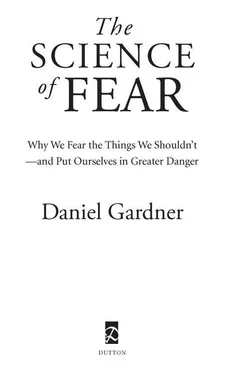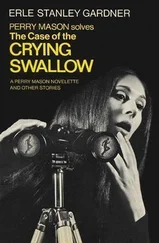Daniel Gardner - The Science of Fear
Здесь есть возможность читать онлайн «Daniel Gardner - The Science of Fear» весь текст электронной книги совершенно бесплатно (целиком полную версию без сокращений). В некоторых случаях можно слушать аудио, скачать через торрент в формате fb2 и присутствует краткое содержание. ISBN: , Издательство: Penguin Group (USA) Incorporated, Жанр: Психология, Политика, Прочая научная литература, на английском языке. Описание произведения, (предисловие) а так же отзывы посетителей доступны на портале библиотеки ЛибКат.
- Название:The Science of Fear
- Автор:
- Издательство:Penguin Group (USA) Incorporated
- Жанр:
- Год:неизвестен
- ISBN:9780525950622
- Рейтинг книги:3 / 5. Голосов: 1
-
Избранное:Добавить в избранное
- Отзывы:
-
Ваша оценка:
- 60
- 1
- 2
- 3
- 4
- 5
The Science of Fear: краткое содержание, описание и аннотация
Предлагаем к чтению аннотацию, описание, краткое содержание или предисловие (зависит от того, что написал сам автор книги «The Science of Fear»). Если вы не нашли необходимую информацию о книге — напишите в комментариях, мы постараемся отыскать её.
The Science of Fear — читать онлайн бесплатно полную книгу (весь текст) целиком
Ниже представлен текст книги, разбитый по страницам. Система сохранения места последней прочитанной страницы, позволяет с удобством читать онлайн бесплатно книгу «The Science of Fear», без необходимости каждый раз заново искать на чём Вы остановились. Поставьте закладку, и сможете в любой момент перейти на страницу, на которой закончили чтение.
Интервал:
Закладка:
Clarke, Lee, Worst Cases: Terror and Catastrophe in the Popular Imagination, University of Chicago Press, Chicago, IL, 2006.
Clarke, Richard A., Against All Enemies: Inside America’s War on Terror, Free Press, New York, 2004.
Douglas, Mary, and Aaron Wildavsky, Risk and Culture: An Essay on the Selection of Technological and Environmental Dangers, University of California Press, Berkeley, CA, 1983.
Dunbar, Robin, Louise Barrett, and John Lycett, Evolutionary Psychology, One-world Publications, Oxford, UK, 2005.
Flynn, James, Paul Slovic, and Howard Kunreuther (eds.), Risk, Media and Stigma: Understanding Public Challenges to Modern Science and Technology, Earthscan, London, UK, 2001.
Fogel, Robert William, The Escape from Hunger and Premature Death, 1700- 2100, Cambridge University Press, New York, 2004.
Furedi, Frank, Culture of Fear, Continuum, London, 1997.
Gladwell, Malcolm, Blink: The Power of Thinking Without Thinking, Little, Brown & Company, Boston, MA, 2005.
Glassner, Barry, The Culture of Fear, Basic Books, New York, 1999.
Goklany, Indur M., The Improving State of the World, Cato Institute, Washington, DC, 2007.
Herman, Arthur, The Idea of Decline in Western History, Free Press, New York, 1997.
Jenkins, Brian Michael, Unconquerable Nation: Knowing Our Enemy, Strengthening Ourselves, RAND Corporation, Santa Monica, CA, 2006.
Keeley, Lawrence H., War Before Civilization: The Myth of the Peaceful Savage, Oxford University Press, New York, 1996.
Kida, Thomas, Don’t Believe Everything You Think: The Six Basic Mistakes We Make in Thinking, Prometheus Books, Amherst, NY, 2006.
Lichter, S. Robert, and Stanley Rothman, Environmental Cancer—A Political Disease? Yale University Press, New Haven, CT, 1999.
Lomborg, Bjorn (ed.), How to Spend $50 Billion to Make the World a Better Place, Cambridge University Press, New York, 2006.
Lupton, Deborah (ed.), Risk and Sociocultural Theory, Cambridge University Press, New York, 1999.
Lustick, Ian S., Trapped in the War on Terror, University of Pennsylvania Press, Philadelphia, PA, 2006.
McGuire, Bill, Global Catastrophes: A Very Short Introduction, Oxford University Press, New York, 2002.
Margolis, Howard, Dealing with Risk: Why the Public and the Experts Disagree on Environmental Issues, University of Chicago Press, Chicago, IL, 1996.
Mueller, John, Overblown: How Politicians and the Terrorism Industry Inflate National Security Threats and Why We Believe Them, Free Press, New York, 2006.
Murray, David, Joel Schwartz, and S. Robert Lichter, It Ain’t Necessarily So: How the Media Make and Unmake the Scientific Picture of Reality, Rowman & Littlefield, Lanham, MD, 2001.
Mythen, Gabe, Ulrich Beck: A Critical Introduction to the Risk Society, Pluto Press, London, 2004.
Paulos, John Allen, A Mathematician Reads the Newspaper, Anchor Books, New York, 1995.
———, Innumeracy: Mathematical Illiteracy and Its Consequences, Hill and Wang, New York, 1988.
Piatelli-Palmarini, Massimo, Wiley, Inevitable Illusions: How Mistakes of Mind Rule Our Minds, Hoboken, NJ, 1994.
Pidgeon, Nick, Roger E. Kasperson, and Paul Slovic (eds.), The Social Amplification of Risk, Cambridge University Press, New York, 2003.
Pinker, Steven, The Blank Slate: The Modern Denial of Human Nature, Viking, New York, 2002.
Posner, Richard A., Catastrophe: Risk and Response, Oxford University Press, New York, 2004.
Richardson, Louise, What Terrorists Want: Understanding the Enemy, Containing the Threat, Random House, New York, 2006.
Roberts, Julian V., and Mike Hough, Understanding Public Attitudes to Criminal Justice, Open University Press, Maidenhead, UK, 2005.
Roberts, Julian V., and Loretta J. Stalans, Public Opinion, Crime, and Criminal Justice, Westview Press, Boulder, CO, 2000.
Robin, Corey, Fear: The History of a Political Idea, Oxford University Press, New York, 2004.
Ropeik, David, and George Gray, Risk: A Practical Guide for Deciding What’s Really Safe and What’s Really Dangerous in the World Around You, Houghton Mifflin, Boston, MA, 2002.
Rosenthal, Jeffrey S., Struck by Lightning: The Curious World of Probabilities, HarperCollins, New York, 2005.
Schacter, Daniel L., The Seven Sins of Memory: How the Mind Forgets and Remembers, Houghton Mifflin, Boston, MA, 2001.
Stewart, Bernard W., and Paul Kleihues (eds.), World Cancer Report, International Agency for Research on Cancer Press, Lyon, France, 2003.
Sullum, Jacob, Saying Yes: In Defense of Drug Use, Jeremy P. Tarcher, New York, 2003.
Taleb, Nassim Nicholas, The Black Swan: The Impact of the Highly Improbable, Random House, New York, 2007.
Tavris, Carol, and Elliot Aronson, Mistakes Were Made ( But Not by Me ): Why We Justify Foolish Beliefs, Bad Decisions, and Hurtful Acts, Harcourt, San Diego, CA, 2007.
Tetlock, Philip E., Expert Political Judgment, Princeton University Press, Princeton, NJ, 2005.
Timbrell, John, The Poison Paradox: Chemicals as Friends and Foes, Oxford University Press, New York, 2005.
Wildavsky, Aaron, But Is It True? A Citizen’s Guide to Environmental Health and Safety Issues, Harvard University Press, Cambridge, MA, 1995.
Workman, Lance, and Will Reader, Evolutionary Psychology, Cambridge University Press, New York, 2004.
Zaltman, Gerald, How Customers Think: Essential Insights Into the Mind of the Market, Harvard Business School Press, Boston, MA, 2003.
Zimring, Franklin E., The Great American Crime Decline, Oxford University Press, New York, 2007.
Acknowledgments
I first met the psychologist Paul Slovic at the Instituto de Astrofisica in the Canary Islands and so it was amid models of the solar system and other astrophysical phantasmagoria that I first discovered the psychology of risk perception. The universe is interesting, I concluded. But the mind is fascinating.
It is to Paul Slovic’s patience and generosity that I most owe this book. Many thanks. I am similarly indebted to Susan Renouf at McClelland and Stewart, and Stephen Morrow at Dutton for his steady hand and cheerful words. Peter Bobrowsky, Rudyard Griffiths, Dr. Barry Dworkin, Ron Melchers, and Carl Phillips all contributed mightily.
A special note to my editors at the Ottawa Citizen , who have given me freedom and opportunities the like of which most journalists can only dream. Thanks to Neil Reynolds, Scott Anderson, Tina Spencer, Lynn McAuley, and Leonard Stern.
And lastly, I must thank my children, Victoria and Winston, for pulling down my books, scattering my papers, smashing my laptop, shrieking at the most inopportune moments, banging relentlessly on my door, and infecting me with every virus bred in that Petri dish known as junior kindergarten. I have realized that if I can write a book under that onslaught, I can do anything, and so I shall go forward with new confidence. Bless you, darlings.
Index
activism
advertising
air travel
Alhakami, Ali
Al-Mobruk, Sala Abdel
Al Qaeda
American Cancer Society
Ames, Bruce
Amis, Martin
Anchoring Rule
Angell, Marcia
Annan, Kofi
Arbogast, Jessie
Aristotle
arsenic
Arvai, Joseph
Asahara, Shoko
asbestos
Asch, Solomon
Ashcroft, John
asteroids and meteors
Atwood, Margaret
Читать дальшеИнтервал:
Закладка:
Похожие книги на «The Science of Fear»
Представляем Вашему вниманию похожие книги на «The Science of Fear» списком для выбора. Мы отобрали схожую по названию и смыслу литературу в надежде предоставить читателям больше вариантов отыскать новые, интересные, ещё непрочитанные произведения.
Обсуждение, отзывы о книге «The Science of Fear» и просто собственные мнения читателей. Оставьте ваши комментарии, напишите, что Вы думаете о произведении, его смысле или главных героях. Укажите что конкретно понравилось, а что нет, и почему Вы так считаете.












